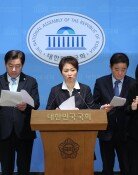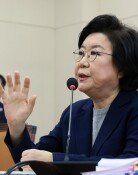Local Governments Compete to Build English Villages
Local Governments Compete to Build English Villages
Posted December. 21, 2004 23:05,
Gyeonggi Province opened an Ansan Camp at Gyeonggi English Town in August 2004 for the first time in the nation. Lately, the camps four-week Vacation Intensive Program, starting January 3, 2005, saw fierce competition among applicants for enrollment: 5,887 students applied for 200 vacant seats, making the ratio of successful to total applicants 1:36.
The program became very popular among parents as it won the reputation as an English educational program with a varied and practical curriculum that matches short-term English language course programs abroad. Indeed, a survey result shows nine out of every 10 students who participated in the program replied, I want to use the program once again.
With its Ansan Camp emerging as a much sought-after local English educational program, Gyeonggi Province plans to set up other English towns in Paju (March 2006) and Yangpyeong-gun (February 2008.)
Gyeonggi-dos success lent support to other local governments nationwide to establish English Camps in their regions.
Seoul, for its part, also opened Seoul English Village in Poongnap-dong, Songpa-gu on December 7. Fifth and sixth grade elementary school students from 25 local districts in Seoul are eligible for enrollment. In the village, students can learn good English for six days by talking with English-speaking native teachers only in English in surroundings like immigration offices, restaurants and broadcasting companies that resemble a small American town. Thanks to its merit, all vacant seats until the end of February 2005 are reserved.
Seoul intends to build Gangbuk English Village (the tentative name for the town) in the latter half of 2005 after remodeling the Academy House in Sooyoo-dong, Gangbuk-gu.
Other than that, Seo-gu, Incheon projects to assign native English-speaking teachers to Seo-gu kindergarten and local primary, middle and high schools in the Cheongna area, a part of its economic special zone, and remodel Changshin elementary school in Wondang-dong to make it an English town. Around 10 local governments and education offices including Daejeon and Jeju Province also are projecting or conducting their plans to establish English villages.
Hong Jong-deuk, chief of strtegy planning office of Gyeonggi English Culture Foundation, noted, A series of local governments and officials from educational offices are coming to our town to get information on the set-up of an English village, adding, Learning English in our town has displayed a remarkable effect of complementing public education and cutting back on private educational fees as taking our course is about the same as learning in English-speaking countries.
About the fever to build English towns, however, he pointed out, It can result in distrust in public education and is likely to send wrong messages to young children that English is a superior language. Moreover, some observers argue that some local governments are only wasting their budget by initiating their businesses without sufficient study of the towns expected effect.






![하버드 의사가 실천하는 ‘뇌 노화 늦추는 6가지 습관’ [노화설계]](https://dimg.donga.com/c/138/175/90/1/wps/NEWS/IMAGE/2026/01/22/133210626.3.jpg)
